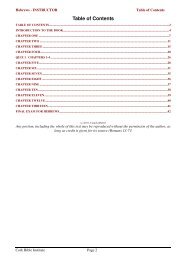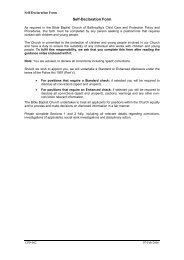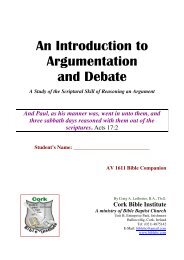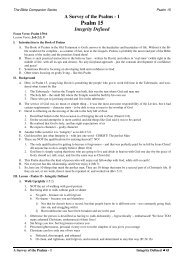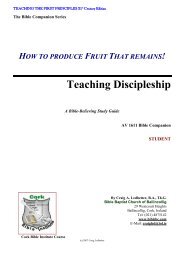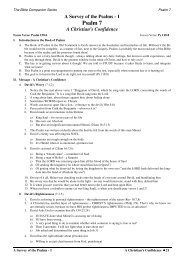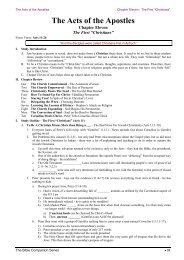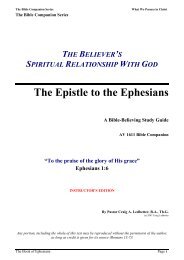THE DOCTRINE OF SALVATION - Student.pdf - Bible Baptist ...
THE DOCTRINE OF SALVATION - Student.pdf - Bible Baptist ...
THE DOCTRINE OF SALVATION - Student.pdf - Bible Baptist ...
Create successful ePaper yourself
Turn your PDF publications into a flip-book with our unique Google optimized e-Paper software.
Soteriology<br />
The Vocabulary Of Salvation.<br />
blood, I will pass over you, and the plague shall not be upon you to destroy you, when I smite the<br />
land of Egypt” (Ex. 12:12,13).<br />
2. substitution. n New Testament times, after Calvary, the Shepherd died for the<br />
sheep.<br />
a. “For it is not possible that the blood of bulls and of goats should take away sins” (Heb. 10:4). As<br />
if to say, !<br />
b. “I am the good shepherd: the good shepherd giveth his life for the sheep” (Jn. 10:11).<br />
c. Thus, Christ became on the cross what He was not—namely, sin—that we might become what<br />
we were not—namely, righteous.<br />
d. The Son of God became the Son of man that sons of men might become the sons of God. (See 2<br />
Cor. 5:21. Read carefully Isa. 53.)<br />
D. Reconciliation.<br />
“God was in Christ, the world unto himself” (2 Cor. 5:19).<br />
1. The meaning of reconciliation.<br />
a. The Old Testament meaning: The Hebrew word kaphar, which means to cover something, is<br />
found some eighty-three times in the Old Testament. Of these, it is translated “ ”<br />
seventy-six times, and “reconciliation” seven times.<br />
b. New Testament meaning. The Greek word allasso means to change from that of to that of<br />
friendship. (See especially Eph. 2:16; Col. 1:20-22; also Mt. 5:24; Rom. 5:10, 11; 11:15; 1 Cor.<br />
7:11; 2 Cor. 5:18-20.)<br />
2. The implications of reconciliation.<br />
a. That a previous animosity once existed.<br />
b. That the offended party (or parties) now views things differently.<br />
3. The two phases of reconciliation.<br />
a. God has reconciled himself to the world through Christ. “And all things are of God, who hath<br />
reconciled us to himself by Jesus Christ, and hath given to us the ministry of reconciliation; to<br />
wit, that God was in Christ, reconciling the world unto himself, not imputing their trespasses<br />
unto them; and hath committed unto us the word of reconciliation” (2 Cor. 5:18, 19).<br />
b. Man is now to reconcile himself to God through Christ. “Now then we are ambassadors for<br />
Christ, as though God did beseech you by us: we pray you in Christ’s stead, be ye reconciled to<br />
God” (2 Cor. 5:20).<br />
4. The chronology of reconciliation.<br />
a. In Eden God and man faced each other in fellowship.<br />
b. After the fall, God and man turned from each other.<br />
c. At Calvary God turned his face toward man.<br />
d. At conversion (through repentance and faith) man turns his face back toward God.<br />
E. Propitiation.<br />
“And he is the propitiation for our sins: and not for ours only, but also for the sins of the whole<br />
world” (1 Jn. 2:2).<br />
“Herein is love, not that we loved God, but that he loved us, and sent his Son to be the<br />
propitiation for our sins” (1 Jn. 4:10).<br />
1. The meaning of propitiation. The Greek word hilasmos means “to render favourable, to<br />
satisfy, to appease.” In simple words, it means to make a full payment of a debt you owe.<br />
2. The method of propitiation.<br />
Cork <strong>Bible</strong> Institute Page 13







